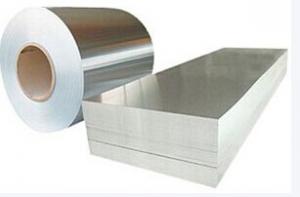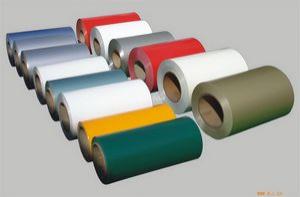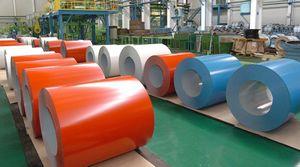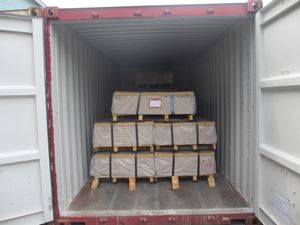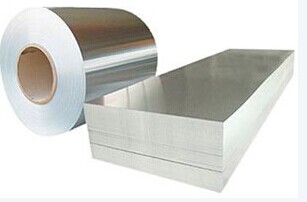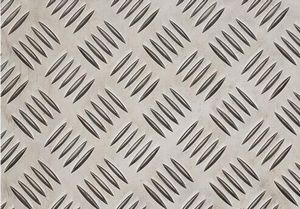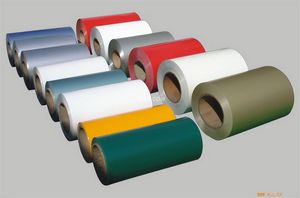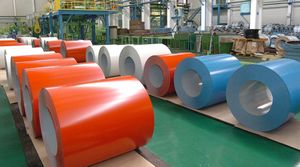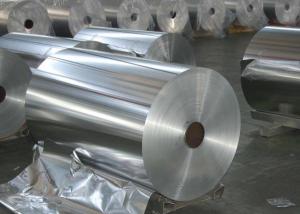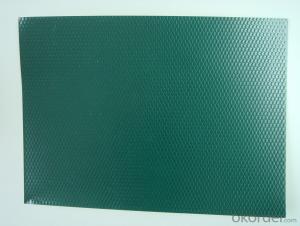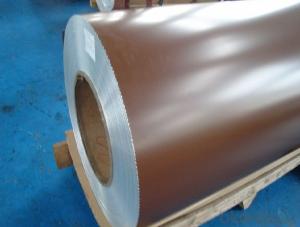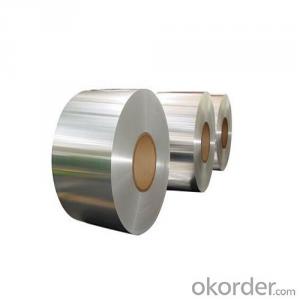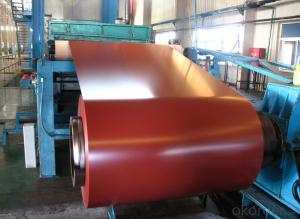Microchannel AA 3003 Aluminium Coils
- Loading Port:
- China Main Port
- Payment Terms:
- TT OR LC
- Min Order Qty:
- -
- Supply Capability:
- -
OKorder Service Pledge
Quality Product, Order Online Tracking, Timely Delivery
OKorder Financial Service
Credit Rating, Credit Services, Credit Purchasing
You Might Also Like
supply Mill-finished / coated aluminum plate/sheet/ coil:
Alloy: AA1050,1060,1100,1200,2024,3003,3304,3005,3015,5052,5086,5754,5083,6061,7050,7475,8011, etc
Temper: O, H14/16/18/22/24/32/ H112/H321/T6,T851,T7451,T7351, etc
Thickness: 0.02mm—20mm
Width: 100mm—2000mm (Can be slitted)
Notice: PE coating / PVDF coating / Embossment can be done if required.
Alloy: AA1050,1060,1100,1200,2024,3003,3304,3005,3015,5052,5086,5754,5083,6061,7050,7475,8011, etc
Temper: O, H14/16/18/22/24/32/ H112/H321/T6,T851,T7451,T7351, etc
Thickness: 0.02mm—20mm
Width: 100mm—2000mm (Can be slitted)
Notice: PE coating / PVDF coating / Embossment can be done if required.
- Q: Is it possible to use a soldering iron to join aluminum coil with solder?
- <p>Traditional soldering irons are not suitable for soldering aluminum coils because aluminum does not readily bond with common solders used for irons. Aluminum has a high oxide layer that forms quickly, which prevents the solder from adhering. Specialized aluminum solder or fluxes are required for this task, and even then, the process might not be as effective as with other metals. For aluminum, brazing or welding techniques are often more appropriate.</p>
- Q: Are there any specific guidelines for the storage of aluminum coils?
- Aluminum coils have specific guidelines for storage, and here are some key considerations: 1. When storing aluminum coils, it is necessary to place them in a clean, dry, and well-ventilated area. The storage facility should be free from excessive humidity, direct sunlight, and temperature fluctuations. 2. To prevent damage, handle the coils with care. Appropriate lifting equipment should be used to lift them, avoiding any bending or deformation. 3. Proper support is crucial when stacking the coils to prevent distortion or collapse. It is recommended to stack the coils horizontally on a flat surface, preferably on pallets or racks. Sufficient space should be left between each coil to allow for ventilation. 4. Protect the coils from dust, dirt, and moisture. Cover them with suitable protective materials like plastic sheets or tarpaulins to prevent contamination or oxidation. 5. Labeling each coil with relevant information, such as the alloy type, size, and production date, is advisable. This helps with easy identification and efficient inventory management. Additionally, maintaining an organized storage system prevents damage and enables efficient retrieval. 6. Regular inspection and inventory checks are necessary to identify any signs of damage or deterioration. Rotate the coils to ensure proper usage and avoid prolonged storage that could affect quality. It is important to note that these guidelines may vary depending on the specific requirements of the manufacturer or supplier. Therefore, it is advisable to consult the manufacturer's recommendations or seek professional advice for the storage of aluminum coils.
- Q: What are the different packaging options for aluminum coils?
- There are several different packaging options for aluminum coils, including wooden crates, cardboard boxes, shrink wrap, and stretch wrap. These packaging options help protect the coils from moisture, dust, and physical damage during transportation and storage. Additionally, some suppliers may offer customized packaging solutions to meet specific requirements and ensure the safe delivery of aluminum coils.
- Q: the ingredient on the back says aluminum?also ..what is sodium benzoate?Is all this stuff that terrible for you? Or does it mean something else?
- i have no idea why aluminum would be in pancake mix, but i know for sure that sodium benzonate is a preservative and it is bad for you
- Q: What are the different coil winding options for aluminum coils?
- There are several coil winding options for aluminum coils, each with its own advantages and applications. 1. Layer Winding: This is the most common and simplest method, where the coil is wound in a single layer. It is cost-effective and suitable for applications where high voltage or high current is required. 2. Disc Winding: In this method, the coil is wound in a disc-like shape, with each layer stacked on top of the previous one. This winding technique allows for better heat dissipation and is often used in high-frequency applications. 3. Helical Winding: Helical winding involves winding the wire in a spiral pattern around the coil form. This method allows for a higher number of turns in a given space, resulting in increased inductance. It is commonly used in applications requiring high inductance, such as transformers and inductors. 4. Interleaved Winding: Interleaved winding is a technique where multiple layers of coil windings are interleaved, meaning one layer is wound in one direction, and the next layer is wound in the opposite direction. This method helps reduce the overall size of the coil and improves its efficiency by reducing the proximity effect. 5. Foil Winding: Foil winding involves using thin layers of aluminum foil instead of wire to create the coil. This method offers better cooling and reduces the overall size of the coil. It is commonly used in high-power applications, such as electric vehicle motors and power generators. 6. Sectional Coil Winding: In this method, the coil is divided into sections, and each section is wound separately. It allows for better control over the coil's shape and size, making it suitable for unique or irregularly shaped applications. The choice of coil winding option depends on factors such as the desired electrical characteristics, space constraints, cooling requirements, and cost considerations. It is important to carefully analyze the requirements of the specific application before selecting the appropriate coil winding technique for aluminum coils.
- Q: Can aluminum coils be used in heat exchangers?
- Yes, aluminum coils can be used in heat exchangers. Aluminum is a popular choice for heat exchangers due to its excellent thermal conductivity and corrosion resistance. The high thermal conductivity of aluminum allows for efficient heat transfer, making it an ideal material for heat exchangers. Additionally, aluminum's corrosion resistance ensures that the coils will remain durable and functional even in harsh environments.
- Q: What are the common surface treatments for aluminum coils in the marine industry?
- The common surface treatments for aluminum coils in the marine industry include anodizing, painting, and powder coating.
- Q: How are aluminum coils protected against moisture during storage?
- Aluminum coils are typically protected against moisture during storage through the use of various methods and materials. One common method is the application of a protective coating, such as a thin layer of oil or a corrosion-resistant film, which forms a barrier between the coil and any moisture present in the environment. This coating helps to prevent direct contact between the aluminum surface and water, minimizing the risk of corrosion or other moisture-related damage. In addition to protective coatings, aluminum coils may also be stored in a controlled environment with low humidity levels. This can be achieved by storing the coils in a dry warehouse or using dehumidifiers to remove excess moisture from the storage area. By controlling the humidity, the risk of moisture condensation on the coils is reduced, further protecting them from potential damage. Furthermore, proper packaging is crucial in protecting aluminum coils against moisture during storage. Coils are often wrapped in moisture-resistant materials, such as plastic or moisture-proof paper, to create a barrier that prevents moisture from reaching the coils. Additionally, the packaging is often sealed to provide an airtight environment, further minimizing the chances of moisture ingress. Regular inspection and maintenance are also important to ensure the continued protection of aluminum coils during storage. This includes checking the integrity of the protective coatings, monitoring the storage environment for any changes in humidity levels, and promptly addressing any signs of moisture damage. Overall, the use of protective coatings, controlled storage environments, proper packaging, and regular maintenance are key factors in protecting aluminum coils against moisture during storage. By implementing these measures, the risk of moisture-related damage is significantly reduced, ensuring the quality and integrity of the coils until they are ready for use.
- Q: Explain the differences between aluminum coil and aluminum foil when used in food packaging.
- <p>Aluminum coil and aluminum foil are both used in food packaging but serve different purposes. Aluminum coil is typically thicker and more rigid, used for making aluminum cans and containers. It provides a strong barrier against light, air, and moisture, which is crucial for preserving the quality and freshness of food. Aluminum foil, on the other hand, is thinner and more flexible, often used for wrapping food to protect it from contamination and to retain heat or cold during cooking or storage. It's also used for baking and roasting to prevent food from sticking to the pan or to add a crispy texture. While both materials are recyclable and provide a barrier against external elements, their specific applications in food packaging differ based on their physical properties and the needs of the packaging process.</p>
- Q: Are aluminum coils suitable for beverage can manufacturing?
- Aluminum coils are indeed appropriate for the production of beverage cans. Aluminum is the favored material for this purpose because of its numerous beneficial characteristics. To begin with, aluminum is lightweight, enabling easy transportation and handling. This is especially crucial in the beverage industry, where a substantial number of cans are manufactured and distributed. Furthermore, aluminum possesses high malleability, allowing it to be shaped into the desired form without compromising its structural integrity. This quality makes it perfect for the manufacturing of cans, as it can be effortlessly molded into the cylindrical shape required and withstand the pressure exerted by carbonated beverages. Moreover, aluminum is non-toxic, ensuring that it does not contaminate the beverages stored within the cans. It also acts as a protective barrier against light, oxygen, and moisture, effectively preserving the flavor and quality of the beverages. Additionally, aluminum is recyclable, thus making it an environmentally friendly option for can production. The recycling process for aluminum consumes significantly less energy than the production of new aluminum, rendering it a sustainable material choice. In summary, the appropriateness of aluminum coils for beverage can manufacturing is evident due to their lightweight nature, malleability, non-toxicity, preservation properties, and recyclability.
Send your message to us
Microchannel AA 3003 Aluminium Coils
- Loading Port:
- China Main Port
- Payment Terms:
- TT OR LC
- Min Order Qty:
- -
- Supply Capability:
- -
OKorder Service Pledge
Quality Product, Order Online Tracking, Timely Delivery
OKorder Financial Service
Credit Rating, Credit Services, Credit Purchasing
Similar products
Hot products
Hot Searches
Related keywords

